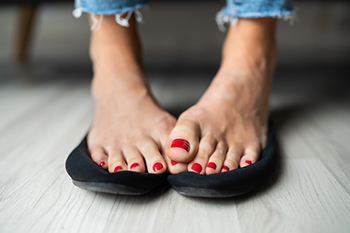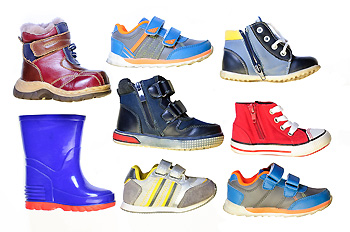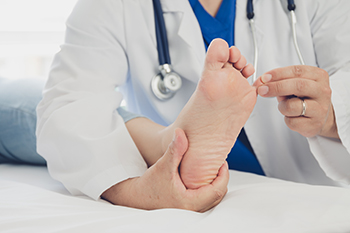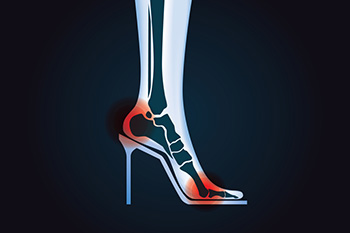Items filtered by date: October 2022
Uncomfortable Plantar Hyperhidrosis

The medical term used when referring to excessively sweaty feet is plantar hyperhidrosis. Approximately five percent of the population is affected by this condition. Foot conditions like athlete’s foot and toenail fungus can accompany plantar hyperhidrosis in addition to an odor emanating from the feet. Hyperhidrosis results from the overproduction of sweat glands in the feet and may cause discomfort and embarrassment. Research suggests that it may be beneficial to keep a journal of sweating episodes to help pinpoint triggers, such as eating certain foods or emotions that may cause anxiety. It is best to avoid wearing socks that are made from nylon materials, unlike cotton socks which may help to ensure proper ventilation. Additionally, staying hydrated may lessen the intensity of sweaty feet. Please schedule an appointment with a podiatrist who can perform tests to determine if your feet are excessively sweaty as well as the treatment method that is best for you.
If you are suffering from hyperhidrosis contact one of our podiatrists of Advanced Ankle & Foot Surgeons. Our doctors can provide the care you need to attend to all of your foot and ankle needs.
Hyperhidrosis of the Feet
Hyperhidrosis is a rare disorder that can cause people to have excessive sweating of their feet. This can usually occur all on its own without rigorous activity involved. People who suffer from hyperhidrosis may also experience sweaty palms.
Although it is said that sweating is a healthy process meant to cool down the body temperature and to maintain a proper internal temperature, hyperhidrosis may prove to be a huge hindrance on a person’s everyday life.
Plantar hyperhidrosis is considered to be the main form of hyperhidrosis. Secondary hyperhidrosis can refer to sweating that occurs in areas other than the feet or hands and armpits. Often this may be a sign of it being related to another medical condition such as menopause, hyperthyroidism and even Parkinson’s disease.
In order to alleviate this condition, it is important to see your doctor so that they may prescribe the necessary medications so that you can begin to live a normal life again. If this is left untreated, it is said that it will persist throughout an individual’s life.
A last resort approach would be surgery, but it is best to speak with your doctor to find out what may be the best treatment for you.
If you have any questions please feel free to contact our office located in O'Fallon, and New Baden, IL . We offer the newest diagnostic and treatment technologies for all your foot and ankle needs.
Children’s Feet and Shoes

Toddlers are usually flat-footed when they start to walk, and their feet may turn inward known as in-toeing. Flat feet should resolve as bones develop and the feet become stronger. In-toeing should also improve with age. Toddlers should go barefoot or wear soft-soled shoes to promote balance, posture, and coordination. Children receive important sensory information from the soles of their feet touching the ground and they develop muscle strength this way. When children have been walking confidently for some time, they can begin to wear firmer-soled shoes. Footwear can help protect their feet from injury and temperature. Their feet should be professionally measured for length and width. Kids' feet grow quickly, and their shoe size may change every few months. Shoes that are too tight can negatively affect a child’s walking pattern and cause other problems like ingrown toenails. Instead, children’s shoes should be comfortable, with plenty of room in the toe box. They should have a flexible, flat sole that can bend near the toe. The front of the shoe should be wider than the heel, to match the foot's natural shape. The shoes need to be secured with laces or straps that prevent the foot from moving or slipping. See a podiatrist if your child is experiencing foot pain or if you are concerned with how they walk.
The health of a child’s feet is vital to their overall well-being. If you have any questions regarding foot health, contact one of our podiatrists of Advanced Ankle & Foot Surgeons. Our doctors can provide the care you need to keep you pain-free and on your feet.
Tips for Keeping Children's Feet Healthy
- Make sure their shoes fit properly
- Look for any signs of in-toeing or out-toeing
- Check to see if they have Clubfoot (condition that affects your child’s foot and ankle, twisting the heel and toes inward) which is one of the most common nonmajor birth defects.
- Lightly cover your baby’s feet (Tight covers may keep your baby from moving their feet freely, and could prevent normal development)
- Allow your toddler to go shoeless (Shoes can be restricting for a young child’s foot)
- Cut toenails straight across to avoid ingrown toenails
- Keep your child’s foot clean and dry
- Cover cuts and scrapes. Wash any scratches with soap and water and cover them with a bandage until they’ve healed.
If you have any questions, please feel free to contact our office located in O'Fallon, and New Baden, IL . We offer the newest diagnostic and treatment technologies for all your foot care needs.
What Is Maffucci Syndrome?

Podiatrists are familiar with the fact that there are a number of rare foot conditions that can impact the health of someone’s feet. Maffucci syndrome is one such rare foot condition. This condition typically impacts the hands and the feet. It is so rare that less than 200 cases have been reported since its discovery in 1881. If an individual has Maffucci syndrome, they may experience the development of benign growths on the bones of the feet. These growths are especially located at the end of the bones. This condition is potentially serious because although the growths are initially benign, it is possible that they may become malignant (meaning cancerous). Interestingly, Maffucci syndrome is not an inherited condition, and those living with the syndrome can be smaller in stature. If you want to learn more about Maffucci syndrome or other rare foot conditions, contact a podiatrist today.
Some foot conditions may require additional professional care. If you have any concerns, contact one of our podiatrists of Advanced Ankle & Foot Surgeons. Our doctors can provide the care you need to keep you pain-free and on your feet.
Rare Foot Conditions
The majority of foot conditions are common and can be treated by a podiatrist. Standard diagnostic procedures are generally used to identify specific conditions and treatment can be rendered. A podiatrist also treats rare foot conditions which can be difficult to diagnose and may need extra attention and care.
There are many rare foot conditions that can affect children. Some of these can include:
- Freiberg’s disease
- Kohler’s disease
- Maffucci syndrome
Freiberg’s disease - This can be seen as a deterioration and flattening of a metatarsal bone that exists in the ball of the foot. It typically affects pre-teen and teenage girls, but can affect anyone at any age. Symptoms that can accompany this can be swelling, stiffness, and the patient may limp.
Kohler’s disease - This often targets the bone in the arch of the foot and affects younger boys. It can lead to an interruption of the blood supply which ultimately can lead to bone deterioration. The patient may limp or experience tenderness, swelling, and redness.
Maffucci syndrome - This affects the long bones in a child’s foot leading to the development of abnormal bone lesions. They are benign growths and typically develop in early childhood and the bones may be susceptible to breaking.
A podiatrist can properly diagnose and treat all types of rare foot conditions. If your child is affected by any of these symptoms or conditions, please don’t hesitate to call our office so the correct treatment method can begin.
If you have any questions please feel free to contact our office located in O'Fallon, and New Baden, IL . We offer the newest diagnostic tools and technology to treat your foot and ankle needs.
Are Bunions Affecting Your Everyday Life?
High Heels Can Affect the Feet and Ankles

Research has shown that the shoes women wear, specifically high heels and sandals, are major contributors to heel and ankle pain. The best way to avoid a future of painful feet is to avoid these types of shoes early in life. Opting instead for sneakers or athletic footwear that provide the proper cushioning and support for the feet, heels and ankles is recommended. With every step you take, a significant amount of force is transmitted to the ankles, heels, and feet. Without the proper support or protection, these areas are put at risk for injury. Improper footwear can also contribute to toe problems, including bunions, calluses, corns, and hammertoes. Choosing comfort over style is suggested as a way to avoid painful problems later in life. Other recommendations are to wear shoes that conform to the shape of your foot, avoid shoes with pointed or tapered toes, and buy shoes that fit well – regardless of the size on the box. For more information on the risks of wearing high heels, or for help with any painful foot and ankle conditions you may have, please visit a podiatrist.
High heels have a history of causing foot and ankle problems. If you have any concerns about your feet or ankles, contact one of our podiatrists from Advanced Ankle & Foot Surgeons. Our doctors can provide the care you need to keep you pain-free and on your feet.
Effects of High Heels on the Feet
High heels are popular shoes among women because of their many styles and societal appeal. Despite this, high heels can still cause many health problems if worn too frequently.
Which Parts of My Body Will Be Affected by High Heels?
- Ankle Joints
- Achilles Tendon – May shorten and stiffen with prolonged wear
- Balls of the Feet
- Knees – Heels cause the knees to bend constantly, creating stress on them
- Back – They decrease the spine’s ability to absorb shock, which may lead to back pain. The vertebrae of the lower back may compress.
What Kinds of Foot Problems Can Develop from Wearing High Heels?
- Corns
- Calluses
- Hammertoe
- Bunions
- Morton’s Neuroma
- Plantar Fasciitis
How Can I Still Wear High Heels and Maintain Foot Health?
If you want to wear high heeled shoes, make sure that you are not wearing them every day, as this will help prevent long term physical problems. Try wearing thicker heels as opposed to stilettos to distribute weight more evenly across the feet. Always make sure you are wearing the proper shoes for the right occasion, such as sneakers for exercising. If you walk to work, try carrying your heels with you and changing into them once you arrive at work. Adding inserts to your heels can help cushion your feet and absorb shock. Full foot inserts or metatarsal pads are available.
If you have any questions please feel free to contact our office located in O'Fallon, and New Baden, IL . We offer the newest diagnostic and treatment technologies for all your foot and ankle needs.

